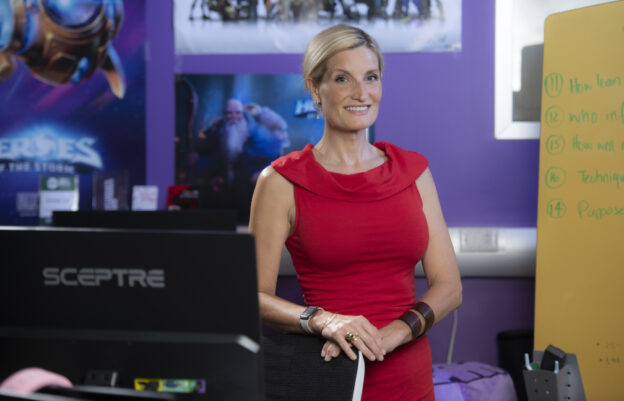ADL’s Center for Technology and Society Names Constance Steinkuehler a Belfer Fellow
 On Sept. 1, 2021, the Center for Technology and Society (CTS) of the Anti-Defamation League (ADL) announced its fourth class of Belfer Fellows, noting that they will “focus on research bridging the intersection of tech and civil rights.” The Belfer Fellowship, started in 2018 with the support of the Robert Belfer Family, builds awareness around online hate and digital citizenship, supporting the ADL vision of “a world in which no group or individual suffers from bias, discrimination or hate.”
On Sept. 1, 2021, the Center for Technology and Society (CTS) of the Anti-Defamation League (ADL) announced its fourth class of Belfer Fellows, noting that they will “focus on research bridging the intersection of tech and civil rights.” The Belfer Fellowship, started in 2018 with the support of the Robert Belfer Family, builds awareness around online hate and digital citizenship, supporting the ADL vision of “a world in which no group or individual suffers from bias, discrimination or hate.”
Informatics Professor Constance Steinkuehler of UCI’s Donald Bren School of Information and Computer Sciences (ICS) is one of three new Belfer Fellows, selected for her research into the cognitive and social aspects of online multiplayer videogames and esports. “The Belfer Fellowship is a big honor,” she says. “ADL is the leading organization working at the forefront of anti-extremist efforts.”
Using the fellowship funding, plus a Confronting Extremism award from UCI, Steinkuehler is leading a project that is examining whether online games normalize toxicity and extremism, and the impacts on adolescents and young adults ages 13-25.
Exposing Hate-Based Groups in Games
“Anti-democratic, hate-based groups have infiltrated game communities, not because games are unique — they’re not — but because extremist groups have infiltrated just about every space and platform online,” says Steinkuehler. “But online games are an area of particular concern because they are the digital playground for both adults and youth.”
The project led by Steinkuehler builds on a comprehensive literature review started over the summer, exploring online harassment and game spaces. “There’s concern around recruitment, but I think the bigger concern is actually the normalizing of hate-based anti-democratic extremist views,” says Steinkuehler. “The language and rhetoric of white supremacy and hate have been condemned throughout the entire history of the U.S., yet today you can find gamers engaged in intolerant hate speech and online harassment, all under the rubric of ‘joking’ when their language and actions do real harm.”
Over the next year, through surveys and interviews, Steinkuehler aims to gain a better understanding of young people’s online exposure to extremism and toxicity in games. “We’ll be looking at all forms of online harassment in game spaces and especially in the form of anti-democratic white racist ideology.”
Confronting Extremism at UCI
In support of this work, Steinkuehler also received a Confronting Extremism award through UCI’s Office of Inclusive Excellence. “The OIE award will help us dial in and oversample at UCI so we can understand what’s happening on our campus specifically and how our students are coping,” she says. “We have such a rich community of gamers between our games major and campus clubs and the esports program, so we want to understand their experiences [and] determine what we can do to intervene.”
So while the Belfer Fellowship is allowing Steinkuehler to consider a broad representative sample of youth across online games, the UCI award allows for more targeted work on campus, including an academic summit hosted here at UCI next June.
“UCI is a recognized national leader in videogames research and design. We’re also a national leader in inclusive excellence,” she says. “So, it’s no surprise that we have something to contribute here toward making online games a safer, more humane space.”
— Shani Murray